If I was 17 and into seeing a movie with my girlfriend and didn’t care about anything except cheap thrills and maybe getting some action? I’d take her to The Fog, the weekend’s #1 film with a projected $13 or $14 million haul. In Her Shoes is #4 and on track to make $6 million-plus, amounting to a 40% drop from last weekend. I spoke last night to a married movie buff in his 50s who’d just seen The Fog and thought it was shit. I asked if he’d seen In Her Shoes and he said no but he’d like to. (I could tell he wasn’t that into it.) He said his wife wants to see Elizabethtown, which will come in second, by the way, with $11 or $12 million.
 Jeffrey Wells
Jeffrey Wells
Check out this 30 year-old
Check out this 30 year-old trailer for Michelangelo Antonioni’s The Passenger, which Sony Pictures Classics is re-releasing on 10.28. The stuffed-shirt narration sounds so stuffy and forced it’s almost funny. The Passenger is an intriguing, sometimes fascinating film but honestly…? It’s never been in my Antonioni pantheon. L’eclisse, L’aventura, Blow-up and Il Grido are much better films. It’s a notch or two ahead of Zabriskie Point and Red Desert. I haven’t seen it in ages, but part of the problem was casting Maria Schneider opposite Jack Nicholson. On the other hand, there’s that awesome final tracking shot that starts in Nicholson’s hotel room and the moves toward the window…slowly, slowly…and then through the window bars and into the street.
Columbia’s Amy Pascal’s claim in
Columbia’s Amy Pascal’s claim in Sharon Waxman’s N.Y. Times piece (10.15) that Daniel Craig, the new 007, “is the same size as Sean Connery” is hooey. I’m not calling Craig a shrimp, but he’s a good two inches shorter than me. I’m 6 foot 1/2 inch, and I’d say he’s about 5 foot ten and a half inches, give or take…maybe 5′ 11″. (I stood next to him after we did a Layer Cake interview in Park City last Janaury during the Sundance Film Festival.) And I’ve stood next to Connery, and he’s at least 6’1″ or 6’2″. The website www.celebheights.com says he’s 6 foot and 1 and 1/2 inches. The site has Craig at 5’11”.
20th Century Fox is pushing
20th Century Fox is pushing back the release date of The Family Stone from early November to December 16th. It’ll probably be explained that the home-for-the-holidays mood makes it a perfect Xmas release. But of course, Fox has known it’s a Christmassy movie for many months. This is probably about wanting more time to sell it properly and get the definite-interest and first-choice numbers up.
It’s official: Daniel Craig is
It’s official: Daniel Craig is the new James Bond. The first blonde 007, and…the shortest. Sorry but I had to throw that in. I’ve stood shoulder-to-shoulder with Connery, Moore, Brosnan and Craig and I know whereof I speak. But this is easily maskable on-screen. Craig told journos at this morning’s London press conference that the Casino Royale script (I presume he means the revised one by Paul Haggis) is “incredible” and “once I’d read that, I realized that I didn’t have a choice. I had to go for it.” I still say a film can only be as good as the most clueless powerful person on the above-the-line team, and not even a good script can entirely overcome the influence of…well, I’m repeating myself.
Mountain High
Mountain High
Eight or nine movies with gay-themes and prominent gay characters will be playing between now and early December. But only three have serious weight, and only one is unequivocally front-and-center about two guys in love with each other — Ang Lee’s Brokeback Mountain (Focus Features, 12.9).
The other two — Bennett Miller’s Capote and Craig Lucas’s The Dying Gaul (Strand, 11.4) — are really about work and politics. Capote is about a man who’s completely consumed by the writing of a book, and Gaul, which I saw and liked at Sundance ’05, is about Hollywood-style power games.

Brokeback Mountain director Ang Lee at the close of the Venice Film Festival upon accepting the Golden Lion, the fest’s top prize.
There are five or six others that qualify, but it’s imprecise and uncool to lump in Brokeback with the pack. This is a truly exceptional film that owns its own real estate and occupies its own realm.
It’s about a couple of cowboy hands (Jake Gyllenhaal, Heath Ledger) who fall for each other and have sex in tents during fishing trips in the wilds of Montana…but never really act on their passion except for these outings. The film is about denial and shutting down your feelings, and how this finally leads to the shriveling of the soul.
< ?php include ('/home/hollyw9/public_html/wired'); ?>
I renounced using the label of “gay cowboy movie” during the Toronto Film Festival simply because Brokeback‘s thing is much more about lamenting and hurting in the worst way, so if you need a blunt catch phrase call it a “sad cowboy movie.” Simple but true.
It’s so sad at the end it’s a full-out tragedy, and I swear you could be the most rabid homophobe alive and you’d still be thinking, “Jeez, these guys should have just come out with it and gotten together and grown old together.”
Brokeback Mountain is Ang Lee’s most emotionally moving film ever. It’s certainly going to be on almost everyone’s ten-best list, and it may well be nominated for Best Picture by the Academy. It is that good, that strong. But will it make any money? Will straight American guys pay to see it? And what about the red-state bubbas?
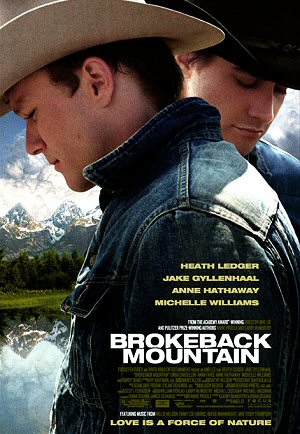
I don’t tend to like gay-guy love stories. I don’t respond to them with comfort or true openness of feeling…but I felt this one. I let it in. I’m pretty average 7-11 so maybe this means something …or not.
I only know that calling this movie a “gay” anything doesn’t feel right. It’s an American heartland drama about two very decent but confused and screwed-up guys. I’m straight but I related, being a little bit on the denying, screwed-up side myself.
The film works to a large extent because of Heath Ledger’s tortured inhabiting of Ennis del Mar, the more repressed and tragic of the two lead characters.
Gyllenhaal gives everything he has to the role of Jack Twist, and he nails it as well as anyone could, but Ennis suppresses his feelings more forcefully and fearfully, and his life is therefore much more screwed up than Jack’s as a result, and so he gets you all the more.
Ledger could be pushed for Best Actor and he probably will be…but if Focus Features wants to win (and maybe they don’t — maybe they’re figuring a Best Actor nomination for seven or eight weeks will bring in the money they want to make) …but if they want to win they should put him up for Best Supporting Actor. Ledger might get a lot of support, but almost gets you no cigar and he almost certainly won’t beat Phillip Seymour Hoffman.
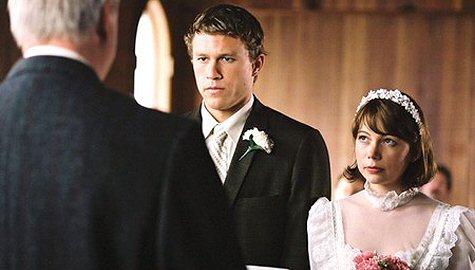
Heath Ledger, Michelle Williams
If you want to twist yourself into a pretzel you could make a case for Ledger’s role being a very strong supporting one. You could say Gyllenhaal’s Jack is the more assertive and impassioned…you could say Ennis is the quieter #2 guy.
Oh, yeah…the other gay movies and characters. One in October and four opening in November…six counting The Dying Gaul. Did distribs decide they had to release these films in October-November because it’s less of a generic family-values time than December?
In order of release there’s Val Kilmer as a gay private eye in Shane Black’s Kiss Kiss Bang Bang (Warner Bros., 10.21), the baby-adopting gay couple (Tyrone Giordano, Brian J. White) in The Family Stone (Fox, 11.4), Cillian Murphy as an Irish drag queen in Neil Jordan’s Breakfast on Pluto (Sony Classics, 11.16), Johnny Depp as a bisexual poet in Libertine (Miramax, 11.18), and a couple of HIV-poz gay guys (Wilson Jermaine Heredia and Jesse L. Martin) in Rent (Columbia, 11.23).
Debate
I wrote a guy a while back who’s heavily invested in Tony Scott’s Domino (New line, 10.14), which is getting killed by the critics, by the way. I told him that as much as I liked Richard Kelly’s excellent script, I almost hated the film.
And then it started…
He: You need to see it again before you trash it. I think you’ll like it more after a second viewing.
Me: I’ll see it again at [an upcoming screening], but I really hated the vibe and that Tony Scott flash-cut crap. I’m just really sick of that shit all of a sudden, and I loved Man on Fire.
He: You have to surrender to Tony’s style and forget about the script.
Me: That’s the problem. Out of the blue, he’s just rubbing me the wrong way.
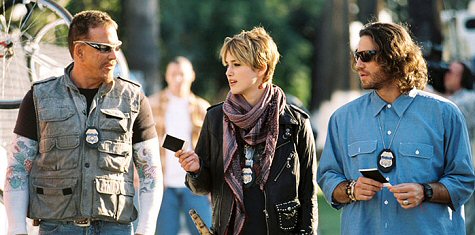
Mickey Rourke, Keira Knightley, Edgar Ramirez
He: This is his ride.
Me: You can say that again.
He: And Keira [Knightley]…do you still have some grudge against her?
Me: Yeah, she doesn’t have “it.” She really doesn’t.
He: She worked so hard.
Me: If you’ve got it, you’ve got it. Working hard isn’t the point if it’s in you, if it’s there.
He: Come on, she really is a special woman. If you met her you would melt.
Me: That’s another issue. Chemical thing.
He: Of all the bimbos in this town…cut her a bit of slack!
Me: I’m not trying to be a dickhead for the sake of being a dickhead. I don’t enjoy going negative on anything or anyone.
He: So many nitwits and you pick on the British intellectual beauty.
Me: I’ll see it again but I don’t know.
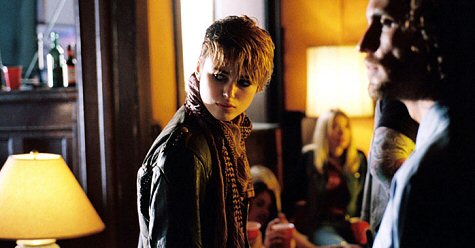
He: Seriously, watch the flick again and pay attention to the subtext. It’s actually a provocative statement and Tony is to be commended. Come on…I thought you had more rock’n roll taste! Did none of the comedy play for you?
Me: What comedy? Oh, the Chris Walken stuff?
He: Overall it’s going to age well.
Me: Maybe.
He: It plays better upon repeat viewings…really does grow on you…so don’t be so quick to trash it.
Me: Okay.
He: And Keira is a fucking piece of ass. Admit it, fucker!
Me: In all candor, and I’m sharing a piece of my heart here…she really doesn’t do it for me.
Ring Fingers
I’m not inferring, much less presuming, that 20th Century Fox’s ad department ripped off the visual idea presented in the one-sheet for Joaquin Oristrell’s Novios (1999), a Spanish-produced sex farce, in creating the “teaser” one-sheet art for The Family Stone.
Great minds think alike and good ideas are like dandelion pollen in the air. The task of creative people is to grab them and make them into some form of distilled art. I’ll bet the Fox ad guy who dreamt this one up really struggled to get it right and was hugely proud when it was chosen for the poster…and had never heard of Joaquin Oristrell.
And George Harrison didn’t consciously rip off the early ’60s doo-lang, doo-lang song “He’s So Fine” when he wrote “My Sweet Lord”. I was just telling a friend yesterday that nobody owns ideas. They’re just out there and anyone can jump in unless lawyers are involved.
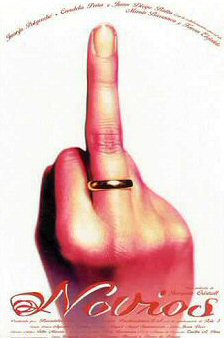
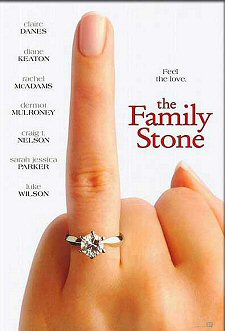
The Family Stone poster image feels subtler and classier, in part because it uses the wedding-ring finger on the left hand which kind of softens the mood, while the Novio taunt is pure up-yours. On top of which the Family Stone hand model has creamier skin, and has had a better manicure.
(Oh, and by the way? I’ve tried to get my wedding-ring finger to stand straight up like the one in the poster and it can’t be done. Not with the other fingers tucked in like that. It’s a sham…an anatomical lie!)
Novio‘s right-hand middle-finger gesture is a bit angrier, which may be appropriate given the wedding band (as opposed to the engagement ring in the Fox poster) and all that marriage entails. It suggests that the creators are more interested in the emotional-rage element than the story, which is about infidelity and revenge between a married guy and his younger female assistant.
Novios sounds pretty good according to an IMDB posting, but it never received U.S. distribution. It played at the Miami Hispanic Film Festival in May 2000.
E-Town
“When can we expect a written apology on your site to Jane Fonda, for your evisceration of her when she passed on Elizabethtown?
“She may have picked the less ambitious film, but it sounds like shoving J-Lo’s face into cake over and over is far better than anything in Crowe’s flick.” — Mark Frenden
Wells to Frenden: No apologies. Committing to any movie is a throw of the dice, but you always go with a verified auteur like Cameron Crowe over an MTV hack making a film for New Line. Even with all the things that didn’t work, a failed Elizabethtown still has it all over a programmer like Monster-in-Law.
Flyover
“The In Her Shoes letdown has me wondering if 20th Century Fox has any idea how to sell a movie to middle America.
“I live in Nashville, which is a medium-market city. It is by no means New York or Chicago, but we typically get a slate of decent movies that are off the main- stream radar and all of the big studio releases. And yet I’ve seen the trailer for In Her Shoes only twice on television in the last few months.
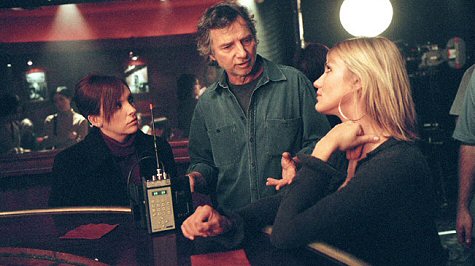
“Keep in mind we have no oversized billboards of upcoming movies that announce a star’s presence or a film’s appeal. Unfortunately, outside of television ads, people here are not as exposed to the marketing campaigns of these films unless you personally seek them out.
“In fact, without your column (which is a daily read) I would not have had Shoes on my list of movies to see…from sheer lack of knowing it was out there. This is a real concern because I think people lose out on seeing quality films because of lackluster efforts by corporate behemoths like Fox.
“Of course they peddle dreck like Two for the Money or Transporter 2 as if it’s Halloween candy. Here’s hoping that they get their shit together and start promoting The Family Stone the right way.” — Brad Jones, Nashville.
Stoned
The Family Stone (20th Century Fox, 11.4) looks like a hit because it has something for lightweight Sex and the City fans (you know…the ones who say they’ve enjoyed this or that film because it’s “fun”) as well as those looking for a quality deal with a little heart and gravitas.
I’ve mentioned that hit HBO series because Sarah Jessica Parker is the nominal star of The Family Stone, although it’s primarily an ensemble dramedy with great performances all around, plus top-grade writing and directing from the unknown but obviously talented Thomas Bezucha.
The producer is Michael London, who also delivered Sideways. These two plus House of Sand and Fog and Thirteen, all made over the last two and a half years, have cemented London’s rep as one of the few guys who make classy personal films that bridge the line between big-studio polish and indie attitude.
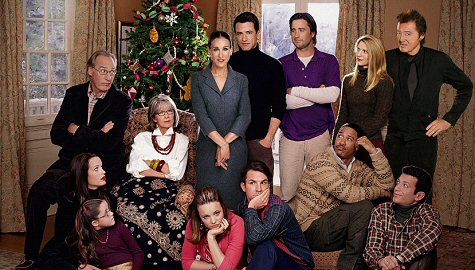
The Family Stone crew (l. to r.): Craig T. Nelson (on rug) Elizabeth Reaser, Savannah Stehlin, (seated) Diane Keaton, (on rug) Rachel McAdams, Paul Schneider (standing) Sarah Jessica Parker, Dermot Mulroney, Luke Wilson, (seated) Brian J. White, (on rug) Tyrone Giordano, (standing) Claire Danes, no comment.
Set in snowy New England (although exteriors were shot in Madison, New Jersey), The Family Stone is a home-for-the-holidays family pic with smarts and feeling and humor that’s simultaneously sensitive, abrasive and “real.” Tight, sharply written, enjoyably acted. I’ve seen it twice so far and I’m looking forward to more viewings.
People have asked me if The Family Stone is mainly a comedy or one of those heartfelt things. I tell them it’s kinda both. It’s not serious-serious, but there’s an emotional sincerity and a moment or two (or three) that gets you deep down. The main residue at the end is one of caring and closeness.
Question is, if you’re 20th Century Fox, who do you sell it to…the Parker fans (i.e., younger women) or people with the ability to savor more than just lively performances and clever dialogue and casseroles spilled on the kitchen floor?
The teaser one-sheet (which came out only two or three weeks ago) and the trailer provide an obvious answer — Fox is going for the Sex and the City crowd. That upraised wedding finger is catchy…it promises a comedy with attitude…and the trailer is selling an idea that Parker is the star of The Family Stone…which isn’t quite the case.
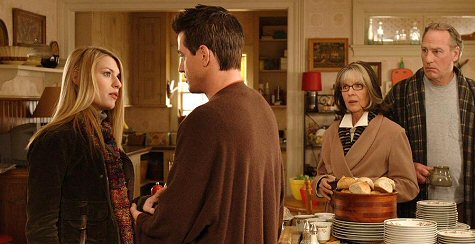
Danes, Mulroney, Keaton, Nelson.
She plays a provocateur who stirs things up among a large, earthy and liberal new-age New England family. This is a dynamic that vaguely resembles Moss Hart and George S. Kaufman’s The Man Who Came to Dinner, although the film itself is closer in spirit to George Cukor’s Holiday.
The Stone family is a brood of grown-up kids (Luke Wilson, Rachel McAdams, Dermot Mulroney, Tyrone Giordano, Elizabeth Reaser) and their late-50ish parents (Diane Keaton and Craig T. Nelson). Parker is Mulroney’s bring-home girlfriend whom everyone hates because “she doesn’t trust or know herself,” as Nelson’s character observes early on. She’s uptight, anal, buttoned-down and trying way too hard.
Thrown by the death-ray looks and other signs of disapproval, Parker pressures her sister (Claire Danes) to drop by to provide emotional support, and this in turn lays the stage for all kinds of upheavals, including two relationship re-alignments and a romantic rekindling.
Thing is, if I didn’t know anything and was just checking out the one-sheet and trailer like anyone else, I would probably be going “naaah…too sitcommy…a girl comedy.” And that’s not what this film is. I’m not the target audience, but if I was Joe Shmoe and I knew how this film actually plays, I’d have a different attitude.

Three weeks before the new opening date (i.e., an 800-screen platform release on 11.4 followed by a wide break on 11.11), Fox seems to be re-thinking the pitch. A new poster has apparently been designed and is on its way out (Fox wouldn’t let me see it or display it for this article), but frankly…?
Changing the one-sheet campaign might broaden the audience a bit (and I hope it does), but big-studio marketers aren’t supposed to shuffle the deck this close to the release date. Not according to the rule book, anyway. Teaser one-sheets are supposed to be in lobbies three or four months before release, but the “real” poster should be out and displayed a couple of months before…six weeks anyway.
After last weekend’s disappointing opening of In Her Shoes I’m suppressing a concern. I’m worried that Fox might blow it again with another quality piece that it doesn’t quite know how to sell. And in this case, an emotionally intimate film that would be a Fox Searchlight release in a more perfect world.
I don’t expect this to happen, mind…and maybe the Sarah Jessica wedding-finger campaign is the way to go after all, but I’m feeling a tiny bit nervous.
Next month, remember, comes a whole ‘nother challenge for Fox with James Mangold’s Walk the Line, which is likely to be seen as a white Ray. It’s been made with great craft and has a pair of Oscar-level performances (Joaqin Pheonix, Reese Witherspoon), yes, but country music ain’t soul music….and those toe-tapping Ray Charles songs helped put Ray over.
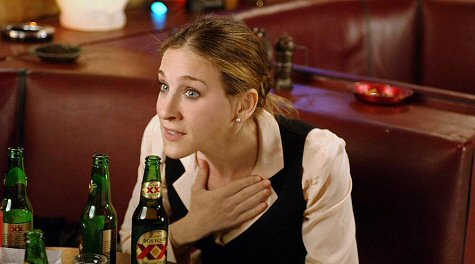
Sarah Jessica Parker
Line will be a natural with the critics and the Academy, but selling it to the public is going to take some doing…let’s face it.
The Family Stone might turn out okay. I know that if a seemingly shallow person likes a film, that’s usually a good sign it’ll be a hit. I know this actress who knows this woman, see, and she went to The Family Stone last weekend and said it was “fun.”
Convincing a woman who enjoys escapist movies that a movie with real emotional substance is “fun.”…that’s like hitting the daily double. There are a lot more people out there who think like this than there are people like me. Girls who don’t wanna pickle, just wanna laugh …you’ve got them, you’re just about there.
I always use my sons as box-office barometers. Jett, 17, says he hasn’t seen the one-sheet and only caught the end of the trailer…no firm impressions. But he said “yeah, cool” when I told him it wasn’t a Sara Jessica Parker movie but more of a mixed bag with funny and sad stuff mixed in. Dylan, 15, says he doesn’t care and isn’t going.
I took an attorney friend to see it last weekend in Pasadena, and he liked it…who wouldn’t? But on the way out he said my liking it as much as I do is proof that I’ve become “a rank sentimentalist.”
Everyone says Keaton will be a Best Supporting Actress nominee and yeah, maybe…but Parker is the one who tears it up and takes the big character journey. Nelson and McAdams are right-on, and Wilson has a fine time with the best role he’s had since Bottle Rocket.
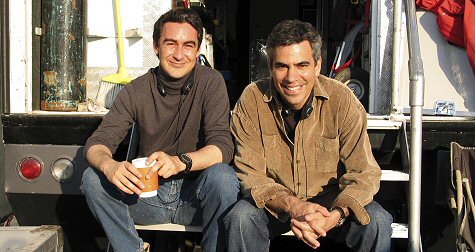
The Family Stone director Thomas Bezucha (l.), producer Michael London
The original title of Bezucha’s script, which kicked around for years and almost got made by indie-level producers twice before the present version came together late last year, was F***ing Hating Her and then Hating Her.
Wilson’s role of Ben Stone was reportedly going to be played in ’03 or ’04 by Billy Crudup, Steve Zahan and/or Aaron Eckhart…but I’m going by Internet hearsay.
Among the actors who were allegedly cast before and then left behind were Selma Blair (in the Claire Danes role of “Julie”), Bridget Moynahan (replaced by Parker); Blythe Danner (the Keaton role ), Donald Sutherland (replaced by Nelson), Maura Tierney (replaced by Reaser) and Johnny Knoxville (replaced by Mulroney…thank God!).
The only thing I don’t like about The Family Stone is the bubbly holiday music, composed by Michael Giacchino, heard over the opening credits. It says to the audience, “Boy, do we have a cute and cuddly movie for you!”
I hate it when musical scores try and establish an emotional mood before the film starts. (Unless it’s a melodrama or a cop film, in which case it’s fine…as long as the music isn’t “cute.”) We’ll get it soon enough, okay?
Another diss for 20th Century
Another diss for 20th Century Fox’s marketing team: Ridley Scott has criticized them for selling last May’s Kingdom Of Heaven as a romantic actioner instead of a religious and political piece, which he argued for but didn’t get. Fox marketers were seemingly afraid of playing up the Islamic-vs.-Christian conflict element in the film’s advertising because this would reflect on the U.S. presence in Iraq and other political issues of the day. Okay, but the running-time issue is a bit more interesting. I read two or three posts last spring claiming that Scott’s three-hour Kingdom cut, which was test-screened before being trimmed, was a somewhat better film that the 2-hour, 25-minute version that went into theatres. So why wasn’t the three-hour cut offered on the recently issued DVD? Because they intend to wait a year and get a second revenue stream out of “Director’s Cut” sometime in ’06, I imagine.
Sony Pictures Entertainment and Eon
Sony Pictures Entertainment and Eon Productions will officially announce that Dan…sorry, will announce the name of whomever’s been chosen to play James Bond in Martin Campbell’s Casino Royale at a London press conference tomorrow (Friday, 10.14). If only Wilson and Broccoli had gone with Quentin Tarantino’s idea for Casino Royale…”let me do it my way, I won’t screw up your franchise,” etc…but they’re going with Campbell and Crash screenwriter Paul Haggis, who’s said to be interested in remaking the Bond series the way Chris Nolan revitalized Batman and Bruce Wayne. This can’t really happen, of course, with producers Michael Wilson and Barbara Broccoli running the show, so forget it. Daniel Craig, whom the Daily Mail identified earlier this week as the new 007, has real machismo and an icy killer quality in his cold gray eyes, but I wonder how the mainstream popcorn crowd (i.e., those who’ve never seen him in Layer Cake or anything else) will respond.
Harold Pinter was named today
Harold Pinter was named today in Stockholm as this year’s winner of the Nobel Prize in literature. The Birthday Party, The Servant, Accident…the screenplays for Turtle Diary, The French Lieutenant’s Woman…of course. But for me the ultimate Pinter work has always been Betrayal, which I first saw on the New York stage in 1980 with Roy Scheider, Raul Julia and Blythe Danner. Maybe the rights holder to David Jones’ riveting 1983 film version (CBS Fox Home Video put out a cruddy, muddy-looking VHS in the mid ’80s) will take notice and finally release a cleanly mastered DVD of this disappeared Pinter film, which costars Ben Kingsley, Jeremy Irons and Patricia Hodges. Where would the art of dialogue be without Pinter’s influence? Verbal evasion, unspoken menace, less is more, the things that are there but unsaid.
The first press screenings of
The first press screenings of Sam Mendes’ Jarhead that I’ve heard about will begin late next week. The sound of those slowed-down synthesized helicopter blades on the website is an obvious salute to Apocalypse Now, but the script suggests it’ll be something more Full Metal Jacket-ish than Platoon-like.
Director Tony Scott (Domino) on
Director Tony Scott (Domino) on his forthcoming remake of Walter Hill’s The Warriors (’79), which will start shooting sometime in ’06: “I see it as Kingdom Of Heaven meets The Warriors because with these gangs…instead of having twenty or thirty guys, I’m going to have three thousand, five thousand guys in the L.A. river beds and it’s going to look like L.A. during the riots. I love the original movie…that’s why I’m in doing this, but I’m not going to copy the original”. Hill’s film,
based on the ancient Greek nonfiction tale “Anabasis,” was about a New York gang trying to make it get home to Coney Island alive after being framed from the murder of an untouchable gang leader. The director’s cut version of Hill’s film came out on DVD on 10.4.
Leonardo DiCaprio obviously has this
Leonardo DiCaprio obviously has this liking for dark heavyweight melodramas (The Blood Diamond, The Departed, The Chancellor Manuscripts, Gangs of New York) or biopics about famous ballsy guys (The Aviator, Catch Me If You Can and a film in development about Timothy Leary). Is anyone else thinking he needs to make something light…a clever comedy, maybe a mushy romance of some kind?
